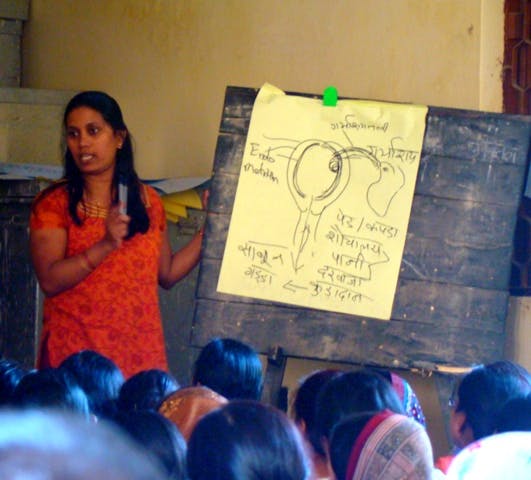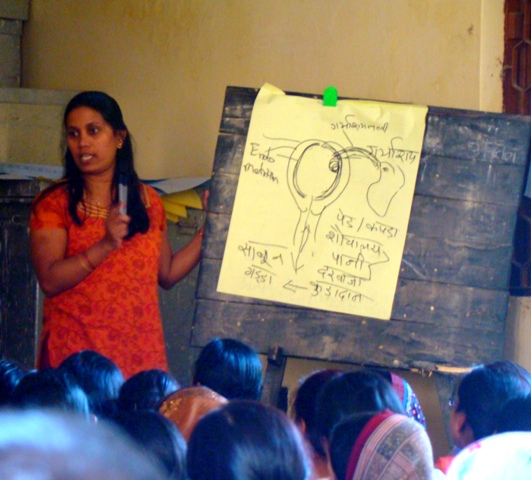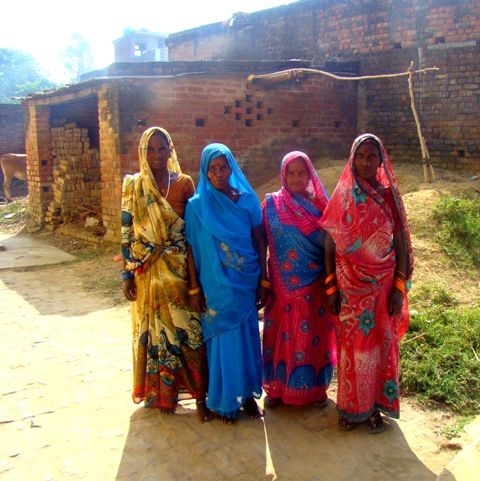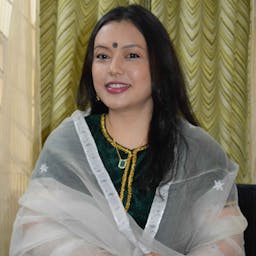Let's talk openly!!!!!!' -Training for teachers on menstrual hygiene in rural India
Jan 21, 2015
Story





5 Nov 2012, Gorakhpur, a small village in Uttar Pradesh is the fifth stop of Nirmal Bharat Yatra (the Great Wash Yatra). The yatra has travelled four major places already viz Wardha, Indore, Kota and Gwalior carrying the clear message of ending open defecation, begin washing hands with soap and practicing hygiene in remote parts of the country. In the 4000 km pan India tour, the brain child of Wash United and Quicksand, the mission is to reach out to the mass through outreach school programs involving teachers of that region, the local government, Anganwadi workers and the community as a whole. In one such outreach program of Nirmal Bharat Yatra a Training of Teachers (TOT) was organized in Gorakhpur Block Resource Centre (BRC) where the implementing body and resource persons included representatives from partners of the yatra, Maria Fernandes from Water Supply and Sanitation Collaborative Council (WSSCC), Arpana from Wash United and Shiv Kumar from Feedback Foundation. It was a clear sunny autumn morning and the enthusiasm of the community was evident in the turn out in the mini auditorium here. Teachers from different schools in the region participated in this program and officials of the Block Resource Centre (BRC) applauded the initiative of the Yatra to reach out to them.
Nirmal Bharat Yatra has been an excellent forum for us to reach out to rural India and involve the community in discussion and creating awareness on public health through simple steps of using soaps to wash hands, make and use toilets and do away with open defecation, and practice hygiene. Maria Fernandes from Water Supply and Sanitation Collaborative Council (WSSCC) began the training on an informative note elaborating on the various faces of superstition and malpractices associated with menstruation in different communities in the country where ignorance, illiteracy and stigma cripple the very health of the womenfolk. She pin pointed how overall hygiene and use of toilets needed to be inculcated into lives of people to ensure better health. She invited participants to talk openly about the traditionally imposed inhibitions associated with menstruation and health issues pertaining to reproductive capacity of womenfolk.
‘A girl out of ignorance did not take proper measures of hygiene during her menstruation and developed itching in her private parts and rashes on her inner thighs. Out of ignorance and stigma associated with it this incident went unreported till a stage where it manifested to disease of the uterus and the womb. In the final stages the doctor who examined the girl said, to save the girl the uterus would have to be taken out by way of an operation. At an early stage of adolescent life, this girl now lives without a uterus and womb. This is a direct outcome of stigma and taboo associated with menstruation in the remote part of our country and how it results in disease,’ said Maria. She added on a serious note the plight of this girl who wouldn’t have marriage opportunities now with no reproductive capacity.
“If we begin to talk openly among ourselves about menstruation, the hygienic practices of using cotton cloth or sanitary pad to absorb the menstrual fluid and changing it frequently in a day, practicing healthy way of disposal of these used sanitary material without contaminating sources of drinking water or our environment and the need to go to a doctor at the slightest hint of infection, then we can overcome the diseases that are resulting from this silence on the matter,’ Maria stressed in the session that by now had engaged both the male and the female participants.
An interesting development in the session was the evident attempt of male teachers to influence or suppress the voice of female counterparts in the session. One lady school teacher in an interaction on if there were toilets in the village or not, informed that there were very less toilets but a male teacher contradicted her statement by defying it and said, this was not so. Earlier in the day a Block Development official addressed the audience reiterating the need to only speak things that will enhance the image of the community at Gorakhpur and not spell out weaknesses that could catch the media eye in the country. Perhaps this was the undercurrent among the male participants who guarded the secret of not enough toilets in the village.
The Training for Teachers (TOT) was conducted successfully here in Gorakhpur and our objective to help the community to begin to speak out about issues relating to water, sanitation and hygiene and draw out their own action plan was achieved. This wind of change, though gradual and will have to be persistent over the coming years, is still a phenomenon in its own right in a country where it has taken decades after our freedom from the British ‘Raj’ to think about it and talk about it ‘openly’.
This wind of change rests on people like Maria Fernandes, 30, married and mother of an infant son who lives with her husband and in-laws in Mumbai, is educated, smart, compassionate and most of all, urban and yet has gone ahead to choose a career option that is tread by very few, that of rural development.
Nirmal Bharat Yatra and it’s dream to be the wind of change in the way India has tackled its sanitation and hygiene problems, rests on people like her.
(For India Water Portal)
http://www.indiawaterportal.org/post/33042




